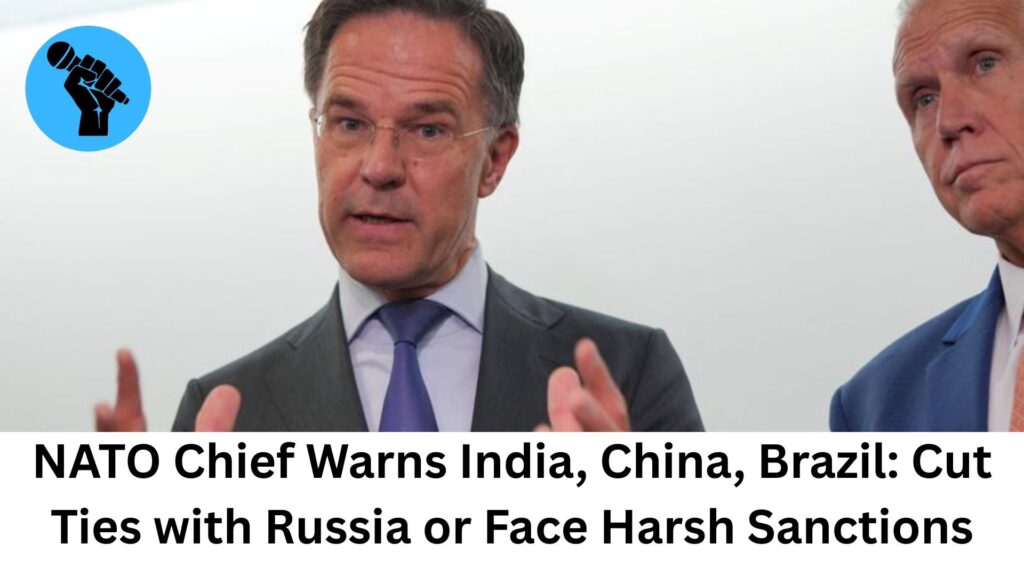In a sharp escalation of global diplomatic pressure, NATO Secretary General Mark Rutte issued a strong warning to countries like India, China, and Brazil over their continued economic ties with Russia. His message was clear — if these nations do not urge Russian President Vladimir Putin to pursue peace in Ukraine, they risk facing severe secondary sanctions that could impact their economies in a “massive way.”
The warning came just a day after former U.S. President Donald Trump announced a powerful new strategy involving increased military support for Ukraine and the threat of 100% tariffs on nations buying Russian exports.
A High-Stakes Deadline: 50 Days to Peace
Speaking to reporters in Washington, Rutte emphasized the urgency of the situation. “If you live now in Beijing, or in Delhi, or you are the president of Brazil, you might want to take a look into this,” he said, underscoring that the economic consequences of continued trade with Russia would be severe if peace talks do not commence within the next 50 days.

“So please make the phone call to Vladimir Putin and tell him that he has to get serious about peace talks,” Rutte continued. “Otherwise this will slam back on Brazil, on India and on China in a massive way.”
Trump’s Aggressive Stance: 100% Tariffs and More Weapons
The new measures were introduced by Trump following his meeting with Rutte at the White House. The former president, seeking to strengthen Ukraine’s hand in negotiations, pledged to provide Ukraine with a massive supply of weapons, including not just air defense systems, but also missiles and ammunition, paid for largely by European allies.
Rutte noted that discussions were ongoing regarding both defensive and offensive weapons, but the specifics are being handled by the Pentagon and the Supreme Allied Commander in Europe, in coordination with Ukrainian forces.
U.S. Lawmakers Voice Concern Over the 50-Day Delay
While Trump’s new steps drew praise, some Republican lawmakers expressed concern over the 50-day peace window. Senator Thom Tillis warned that Russia might use this period to its advantage.
He stated, “Putin could try to use the 50 days to win the war, or to position himself better in negotiations — after committing more violence or capturing more ground. Any of these gains must be considered off the table.”
Tillis’ comments reflect the broader concern that Russia may exploit the timeline, reinforcing calls for tighter scrutiny and readiness to act if Putin does not engage sincerely in peace efforts.
Why This Warning Matters for India, China, and Brazil
The involvement of India, China, and Brazil in trade with Russia has long been a contentious issue, especially in the wake of the Russia-Ukraine war. These nations, while officially neutral, have maintained economic and diplomatic ties with the Kremlin — purchasing Russian oil, weapons, and other commodities.
NATO and Western powers now view this relationship as a barrier to achieving peace. The threat of secondary sanctions — penalties imposed on third-party countries for doing business with sanctioned entities — could significantly strain the economies of these rising global powers if they choose to defy the West’s ultimatum.
Europe and U.S. Stand United
Despite Trump’s often controversial foreign policy style, Rutte emphasized a new sense of transatlantic unity. “Europe will find the money,” he said, ensuring that Ukraine remains in the strongest possible position during peace talks.
This coordinated effort between the United States and Europe is designed to send a clear signal to both Russia and its trading partners: the cost of non-cooperation is rapidly increasing.
What Comes Next?
With the clock now ticking on the 50-day deadline, all eyes are on Moscow, New Delhi, Beijing, and Brasília. The global balance of power is shifting, and decisions made in the next few weeks could define the future of international diplomacy and global trade.
For India, which has historically maintained a balancing act between East and West, the choice may now be more difficult than ever. As Rutte’s warning makes clear, the price of neutrality may soon be too high to bear.
The coming weeks will test the resolve of world leaders like Narendra Modi, Xi Jinping, and Luiz Inácio Lula da Silva. As NATO increases pressure, and the U.S. moves toward decisive action, the fate of Ukraine — and the broader global order — hangs in the balance.
The message is clear: Support peace, or face the price.
